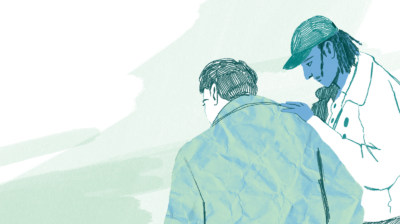Dealing with grief after losing someone by suicide
If you lose someone by suicide, you may experience a range of different emotions.

If someone close to you dies by suicide, it is a tragic loss and you are likely to experience a range of difficult emotions when dealing with your personal grief. Everyone experiences grief differently and you have every right to feel upset, hurt, angry and any other emotions you may experience as you process your own grief.
The grief you may experience after someone dies by suicide can be different from the grief you might feel if someone were to die from an illness or in an unexpected accident. If someone close to you has died by suicide, remember you are not alone. There are supports available to help you and those close to you.
Ways to cope when you lose someone by suicide
Dealing with feelings of anger
If someone close to you dies by suicide, you may experience a range of emotions, including anger. You may feel anger towards the person who has died, yourself, those close to you, or mental health services if you feel that not enough was done to help the person before they died. Feeling angry is natural, but holding on to anger over a long period of time can have a significant, negative impact on your mental health. It is important to try and look after yourself while dealing with your grief. If you are experiencing intense feelings of anger, it might be helpful to speak to someone about it.
Dealing with feelings of shock/disbelief
Coming to terms with the reality that someone you loved has died by suicide can be extremely difficult, especially if you had no previous knowledge that they had suicidal thoughts or were experiencing mental health difficulties. It may be tough to understand how someone close to you could be feeling a certain way without you being aware of it, or to understand why they didn’t ask you for help.
Coming to terms with the reality of what has happened may take a long time, and there is no time frame in which you should deal with or “complete” the grieving process. It is important to remember that everyone grieves in their own way and that you are not expected to feel a certain way after a certain about of time. Speaking to someone about how you are feeling and what you are experiencing can help to process what has happened and come to terms with living without the person you have lost.
Dealing with feelings of guilt
You may experience feelings of guilt if someone close to you dies by suicide. Feelings of guilt can come from questioning what could have been done to prevent the death, or from feeling like you were unaware of the struggle that the person was experiencing.
It is important to remember that no one thing caused the person you know to die by suicide. People die by suicide for many different reasons and you should not feel that you are to blame for the person’s death. It is also important not to blame others around you for the death of the person you knew. Those who were close to the person will be experiencing grief too, and where possible, it is best to try to lean on each other for support while dealing with your loss and grief.
Dealing with feelings of numbness
If someone close to you dies by suicide you may experience feelings of numbness. Feeling numb can mean that you don’t experience sadness, happiness or any other emotion, but instead feel nothing about the situation. You may not feel able to process what has happened, or you might feel confused because it seems so hard to understand how or why it has.
Feeling numb can also be a protective response. When trying to process and understand what has happened feels overwhelming, shutting yourself off emotionally might seem like the only way you can cope. While this can be an understandable short-term response, shutting ourselves off from our emotions is not helpful in the long term.
If you are experiencing numbness, speaking to a mental health professional can help. It is understandable if you feel unmotivated or do not want to speak to anyone, but for your own care and mental health, it is important that you do. You do not have to feel alone while experiencing your grief because there are supports available to help. If you are worried about speaking to a professional, ask a friend or family member to go with you or help you book an appointment.
Dealing with feelings of rejection
You may experience feelings of rejection or of being abandoned if someone close to you dies by suicide. Thoughts like “How could they leave me?” or “Why didn’t they think about me?” may lead you to question the relationship you had with the person. Having feelings and thoughts like this is not uncommon or abnormal, but it is important to remember that the thought process of a person before they die by suicide may not necessarily be clear, simple, or rational, although the person may feel that it is.
People who die by suicide have loved and cared for the people around them and taking their own life is not a reflection of their feelings or commitment to the people closest to them. Speaking to someone who was also close to the person who died about times you shared together can be of help. It can help you to focus on the positive aspects of the relationship and remind you of the love that the person had for you.
Recognising your own emotions
When dealing with grief, you will more than likely experience a range of emotions, and it is okay to recognise that you do not have to feel sad or angry all the time. There may be points when you can laugh and have fun as usual, only to be followed by grief later in the day. You don’t have to grieve a certain way to ‘pay respect’ or prove how wholly sad you are. It’s okay if, in time, you feel less sad than you did previously. That doesn’t mean you care about the person any less, or do not still miss and think about them. It can be a positive sign that you are dealing with your grief in a way that supports your overall wellbeing.
After time you may get to a stage where you accept what has happened. Acceptance does not necessarily mean you have moved past the grief, no longer miss the person or don’t still feel sad or angry about your loss. Acceptance means that you acknowledge what has happened, are able to accept the emotions that accompany the loss, and feel more able to cope and to be present to your own life as it continues to unfold.
Supporting loved ones
If someone close to you dies by suicide, you may have to support other people who are experiencing the loss with you. It can be difficult if a family member or close friend dies by suicide, as it can affect many people within a family and a community. Allowing yourself to be open about your grief and how you are feeling can be of benefit to others going through the same process. If you feel that you are not able to support someone while they are grieving, that’s okay too, as you have a lot to deal with yourself.
Finding support
There are support services available around Ireland for people who are dealing with the death of a loved one who has died by suicide.
HUGG
HUGG provides peer support groups to anyone over 18 years who has lost a loved one to suicide. All of their support groups are provided by people who have been bereaved by suicide and you can access them online or in-person. You can also find resources and signposting to services throughout the country on their website, hugg.ie.
Text About It
Feeling overwhelmed or want to talk to someone right now?
- spunout’s text message support service offers anonymous support 24/7
- Connect with a trained volunteer who will listen to you, and help you to move forward feeling better
- Free-text SPUNOUT to 50808 to begin
Bereavement Support Line
The Bereavement Support Line provides a confidential space for people to speak about their experience or to ask questions relating to the death of someone they cared about.
- Contact their helpline on 1800 80 70 77, from 10am to 1pm, Monday to Friday.
Samaritans
Samaritans offer a confidential listening service where you can speak openly about issues you may be facing.
- Call: Freephone 116 123
- Email: [email protected]
Childline
Childline offers a 24/7 helpline and instant messaging service for people under the age of 18. These services are free, private and confidential where you can talk about anything.
- Childline instant messaging service is available through their website and their phone line, 1800 66 66 66, is available 24 hours per day
Pieta House
Pieta House offers specialised treatment to clients who self harm, suffer from suicidal thoughts or have made multiple suicide attempts
- Pieta House currently offers 24/7 support through SMS text messages, text ‘Help’ to 51444 to get started (standard text messaging rates apply)
- You can also email them 24/7 by sending a message to [email protected] but there may be a delay in receiving a reply
Traveller Counselling Service
The Traveller Counselling Service specifically work with people from the Travelling community. The service works from a culturally inclusive framework which respects Traveller culture, identity, values and norms and works from a perspective of culture centred counselling and psychotherapy. They offer counselling both in person and online.
- Landline: 01 868 5761
- Mobile: 086 308 1476
- Email: [email protected]
There are many other support services around the country for both people dealing with suicidal thoughts and those supporting them. If you visit our Find Help section you search by services and location to find suicide support groups in your local area.
Feeling overwhelmed and want to talk to someone?
- Get anonymous support 24/7 with our text message support service
- Connect with a trained volunteer who will listen to you, and help you to move forward feeling better
- Whatsapp us now or free-text SPUNOUT to 50808 to begin.
- Find out more about our text message support service
If you are a customer of the 48 or An Post network or cannot get through using the ‘50808’ short code please text HELLO to 086 1800 280 (standard message rates may apply). Some smaller networks do not support short codes like ‘50808’.






